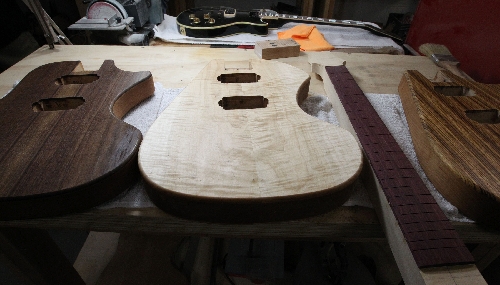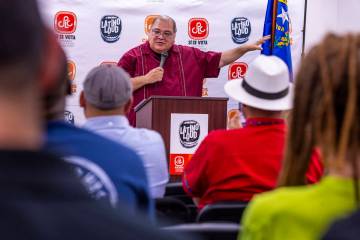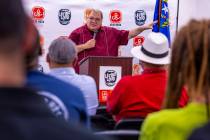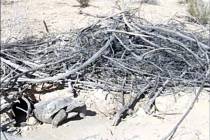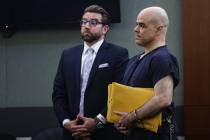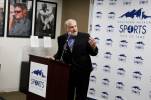Guitar builder, fixer aims to keep chords ringing true
When a 9-year-old Neil Smith got his first guitar - a secondhand Danelectro - he didn't play it immediately.
Instead, he took it apart.
"I used to get myself into so much hot water. I took everything apart," says the man who, as a kid, disassembled his father's stereo and nearly every toy he ever owned.
Even though he went on to play the guitar, marvelously if you consider his resume, Smith never found it as fulfilling as dismantling one and then putting it back together. To him, there was something innately satisfying about knowing how each piece of his guitar fit together to form an instrument capable of making beautiful music.
So it's little surprise that his career path led him from professional musician to a tiny storefront off an industrial road in southwest Las Vegas where he surrounds himself with table saws, soldering guns, chunks of wood, every imaginable tool and item necessary for the building and repairing of guitars.
Since he started playing professionally in the early 1970s, Smith has been tinkering with other musicians' guitars. Now, he counts several Strip musicians among his regular customers, including Bruce Rickard from Cirque du Soleil's "Mystere," Melle Vasquez of "Zumanity" and Jeff Ray, a guitarist for "Jersey Boys."
"Neil's a very good guitarist," says Ray, who plays one of Smith's custom-made guitars in the show. "He made his living playing guitar for a long time so he understands the guitar intimately and he understands what a player needs."
Smith, who played with Sam & Dave, Delbert McClinton, The Chiffons, Bo Diddley and Little Anthony among others, retired after 17 years on the road. He moved to Las Vegas in 1990 and got a college degree in sociology. He thought he wanted to become a social worker and help people. But players kept bringing him their guitars. Turns out, repairing guitars is his true calling.
"I said, 'I may as well open up my own shop,' " Smith recalls.
At first, he worked out of his garage before opening his custom shop, Vegas Guitars. Not content to rely on the knowledge he had gained over the years, Smith sought out legendary guitar repairman Jim Anderson, owner of the Notorious Guitar Hospital in Sparks. If he was going to fix guitars for the rest of his life, Smith needed a real education. Over a period of months, Smith picked Anderson's brain, taking copious notes that he still refers to today.
"As I recall, he kind of pestered his way into my life," Anderson says. "That's at least how I remember it. He called me, told me he had called around trying to find answers to guitar questions and people kept telling him to call me. He's turned out to be a very good repairman."
Anderson doesn't like to waste his time. Initially, he dismissed Smith, who was dogged in his pursuit of Anderson's knowledge. Eventually, Anderson decided to mentor Smith because he displayed a depth of knowledge and ability that he had rarely seen.
"The business that I'm in, it's not something you can start late in your life," Anderson says. "Your fingers have to learn things, your hands have to learn things that become more difficult if you're 35 as opposed to 21. You have to work upside and backwards a lot of time. And you might as well shut your eyes because you can't see what you're doing because you're working inside a guitar. You have to use your fingertips as your eyes."
Those things were second nature to Smith.
Smith was born in California, the youngest of two boys. The tinkering gene runs in his family. Smith's father was a mechanical engineer and enjoyed carpentry as a hobby. His uncle invented a moon rock cutter. His grandfather liked to build things, too. Smith started using a band saw when he was only 7 or 8 years old and saved up his allowance to buy a Mattel woodworking kit.
Smith's first choice in musical instruments was not the guitar. That came out of financial restrictions.
"I started on sax," Smith says. "We couldn't afford a sax so my brother went to the pawnshop and bought me a secondhand guitar."
Smith is tall and lean with blond hair and a beard that make him look years younger than 55. He is soft-spoken and has the quiet presence of a true introvert. He is well-suited to the lonely work of a guitar repairman, which requires him to spend long days with his head down and his attention focused on his workbench. His girlfriend, Susi Steffens, manages the front of the shop, booking work and handling customers.
"I'm one of those people who likes to spend hours alone, focused on something," Smith says.
The work is immensely rewarding. But it's also tedious and time-consuming. It can be stressful at times, too, "because you're working on somebody's baby," Smith explains. "I love repairing because it's challenging."
He loves building because it's relaxing. Smith started making his own guitars a few years ago after repair customers asked him repeatedly if he could build them.
"If you do, that impresses them," Smith says. "Which surprised me because it's harder to repair a guitar than it is to build one from scratch."
Repair work takes up the majority of his time so he builds when he finds extra time. He only builds electric guitars because he finds them more challenging to make compared to an acoustic. A custom order starts at about $1,500.
It takes about six months to finish a guitar but by the time Smith is done, 90 percent of it was made in his custom shop. The rest - tuning pegs, electronics - he gets from small American businesses. Smith does everything by hand so no two are alike. Eventually, Smith hopes to shift to full-time building.
Building, Smith says, "is more joyful for me. When you hear that customer hit that first chord, it's a great feeling."
Contact reporter Sonya Padgett at spadgett@reviewjournal.com or 702-380-4564. Follow @StripSonya on Twitter.






